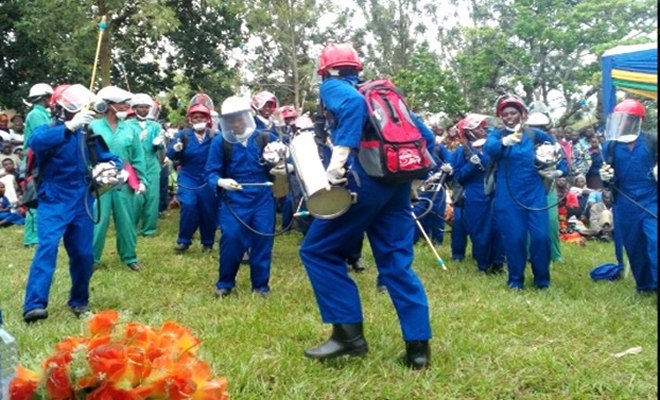Rwanda Army Joins Battle Against Malaria
Published on April 22, 2016 at 7:32 pm in KT Press by Patrick Bigabo
Article retrieved from:

Health Workers prepare
to conduct indoor
residue spray in Gatsibo
district at the catchment
area of Ngarama
Hospital
Rwanda’s Army has
joined the fight against malaria that is increasingly claiming more people both in the
country and in Africa.
The Military is currently engaging different players in the health
sector to harmonise efforts against the killer disease. The Army is
coming in to utilize its resources which includes, doctors, logistical
muscle and the human resource distributed across the country.
The Ministry of Health is championing the campaign. A symposium was
organised together with the military to define strategies and
interventions that can be implemented at different levels of the health
system.
The head of internal medicine at Rwanda Military Hospital, Lt. Col.
Dr. Jules Kabahizi said at the symposium that the army is keen on
contributing significantly to reduce malaria cases with a long term
objective of eliminating the disease.
Health Minister Dr. Agnes Binagwaho said during a one-day Malaria
symposium at Serena Hotel that, “am glad our army has joined the battle
field. ”
“Malaria is a threat, malaria is a problem, and it’s not only for
Rwanda alone but for the whole region and it is affecting even the
economies,” she said.
According to Binagwaho, Rwanda had pushed malaria to the edge and “we
had started the elimination phase but it’s increased ten times more.”
Statistics from the ministry of health indicate the country has
managed to reduce incidence of malaria by 86%, Mobility by malaria by
87% while mortality was reduced by 74%.
Dr. Binagwaho said that mosquitoes are now able to fly between 4 to
22 kilometers a day and survive to up to a month and are able to fly
higher altitudes. This implies they can now easily fly across borders.
“Now they have leant to fly high because of global warming, it’s no
longer cold up there and in less than a month they can cover the
country,” she noted.
The movement of mosquitoes facilitated by several factors makes it
difficult for one country to lay strategies to eliminate Malaria and
thus suggests joint strategies for regional governments.
Malaria experts said drug-resistant malaria is not spreading across
eastern region, but is developing independently in isolated pockets.
For Dr. Binagwaho with this new knowledge on drug-resistant malaria,
there is need for regional member states to collaborate on a new
strategy for combating the potentially fatal parasite.
Prof Zulu Prenji, chair-pathology in Aga Khan university Hospital told KTPress
that Malaria fight needs political support. He explained that in
countries where there are problems such as corruption, the fight becomes
challenged.
Dr. Olushayo Olu, World Health Organisation Representative in Rwanda
says despite remarkable increase in malaria cases, countries still have
room to eliminate Malaria deaths through early detection and prevention.
Meanwhile, in a rare breakthrough, an international team of
scientists has discovered that a mutation that makes parasites resistant
to a key anti-malarial drug winds up killing them.
“The resistant parasites die before they can infect another person,”
said Christopher D. Goodman of the University of Melbourne, a member of
the research team.

Minister of Health
Dr. Agnes Binagwaho
and WHO country
representative
Dr Olushayo Olu
chat after the
Symposium.
Read more at KT Press: